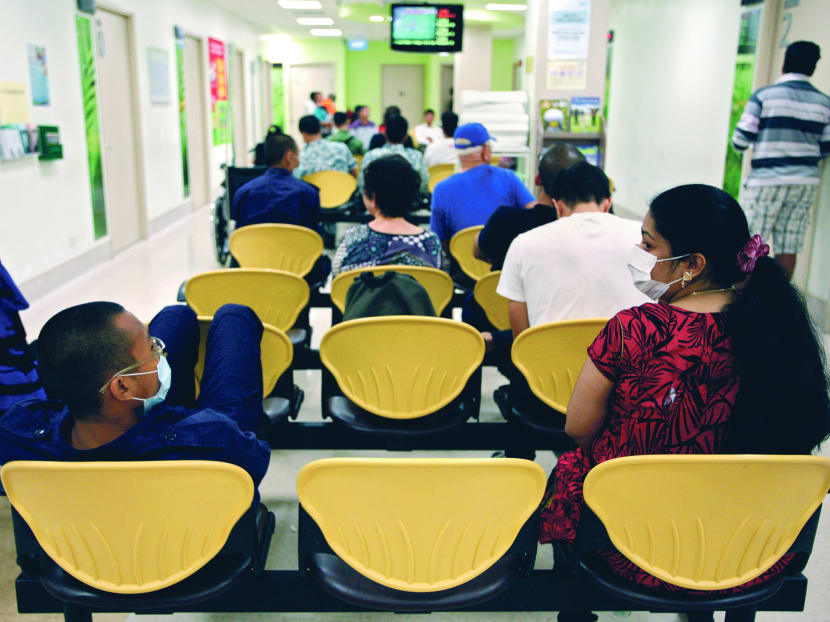Medisave use, drug subsidies to be enhanced
SINGAPORE — From changes to healthcare financing and boosting of capacity, to improving transitions between healthcare settings and support for caregivers, wide-ranging measures were announced by the Ministry of Health (MOH) yesterday in a marathon Committee of Supply debate.

From September, lower- and middle-income earners will receive a subsidy of up to 70 per cent for outpatient specialist care. Photo: Reuters
SINGAPORE — From changes to healthcare financing and boosting of capacity, to improving transitions between healthcare settings and support for caregivers, wide-ranging measures were announced by the Ministry of Health (MOH) yesterday in a marathon Committee of Supply debate.
Among other things, Medisave use will be extended. Patients with chronic disease will no longer be required to pay the first S$30 of each bill in cash before tapping Medisave for treatment from July. And from the first quarter of next year, up to S$300 per year will be allowed for non-cancer-related scans necessary for diagnosis and treatment.
A new Flexi-Medisave scheme will be introduced to allow seniors aged 65 and above to use up to S$200 a year for outpatient treatment at specialist outpatient clinics (SOCs) in public hospitals and polyclinics, as well as private clinics under the Community Health Assist Scheme (CHAS). This will enable them to use Medisave to see a CHAS general practitioner for a cough or cold, for instance. The scheme could be ready by the first half of next year.
In addition to enhanced subsidies at SOCs announced during the Budget last month, subsidies will be increased for drugs at polyclinics and the SOCs from next year. Lower- to middle-income patients will get a 75 per cent subsidy for all standard drugs. Currently, the drugs are either capped at a price of S$1.40 per week or subsidised at 50 per cent of the retail price. Subsidies will be extended to more drugs from next month.
Lasting nearly six hours, the debate saw many Members of Parliament raising concerns about the plight of caregivers and the need to better integrate care. Some MPs took issue with the bed crunch at hospitals, with the sharpest criticism coming from Workers’ Party Chief and Aljunied GRC MP Low Thia Khiang, who remarked that the bed crunch is not a new problem and is an example of “Third World problems in First World Singapore”. He said: “If we are playing catch up, then the question is, are Singapore’s public hospitals on track to meet future healthcare needs, given our population is still expanding and ageing?”
The state of intermediate- and long-term care facilities also came under the spotlight. Tanjong Pagar GRC MP Lily Neo said it was “time MOH establish more and better home care facilities”, while Potong Pasir MP Sitoh Yih Pin said the standards of nursing homes here lag behind “the best in the world” and suggested that MOH operate some nursing homes.
Health Minister Gan Kim Yong reiterated that more than 11,000 extra beds in acute and community hospitals and nursing homes will be added by 2020, even as the MOH seeks to transform delivery and raise quality of care. Programmes to facilitate a patient’s discharge from hospitals will also be ramped up.
Pressed by Mr Low on whether the bed crunch is the result of “MOH’s policy in underestimating demand” previously, and whether having beds in hospital corridors and tents was a “new normal”, Mr Gan said hospital bed projections are done regularly. Population projections, pace of ageing and changes in disease patterns are taken into account and there are many variables that determine demand — such as family structures, sufficiency of step-down facilities and subsidies given.
He said waiting times for acute hospital beds depend on the situation from day to day, and patients should normally not have to wait more than a few hours. Urgent cases are given prompt treatment and patient safety is not compromised, he added. “I think the important thing for us now is to look at hospital capacity and at the same time, how we can transform the care model to rely less on acute hospital capacity,” said Mr Gan.
On healthcare insurance, Mr Gan noted that the MediShield Life Review Committee is still at work. Nevertheless, he said the Government intends to support most of the initial cost of universal coverage under MediShield Life, which will be implemented next year.
For a typical household here comprising working-age parents and two school-going children, premiums will take up no more than half of their annual Medisave inflows, which include top-ups where applicable. For older Singaporeans aged 55 to 64 currently on MediShield, those with median income or less will see no net increase in premiums after permanent subsidies and Medisave top-ups.
Pioneer Generation Package recipients aged 80 and above will have their premiums covered, while younger recipients will co-pay about half their current premiums with the remainder covered through subsidies and top-ups. Extra financial help will be given to those still unable to afford MediShield Life premiums, said Mr Gan.






